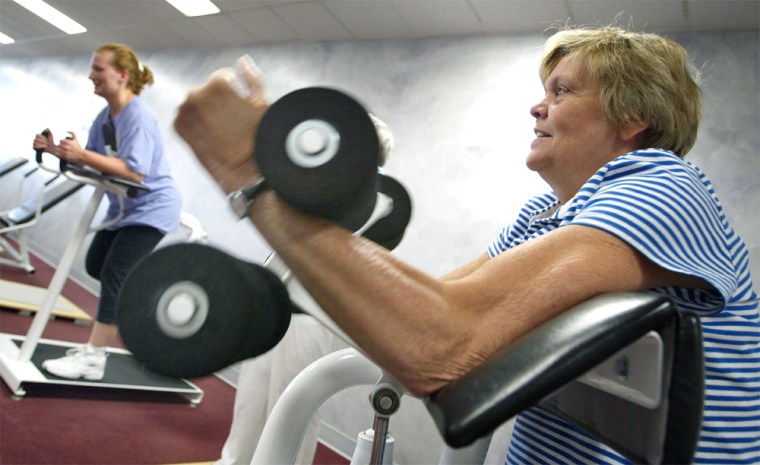Have you vowed to exercise more this year, but aren't sure how to make that resolution stick? Smart Fitness offers some strategies. Have an exercise question? To e-mail us, click here. We’ll post select answers in future columns.
Q: I want to work out but I find it very hard to stay with it after I exercise for a few days. I'd like to make 2004 the year I finally commit to regular exercise. How can I keep myself motivated?
A: Many Americans likely rang in the New Year with a resolution to exercise more. Sales of health club memberships and home exercise equipment typically surge this time of year. But staying motivated is a problem for lots of people like yourself and participation often falls off come spring. That's unfortunate because exercise offers many benefits, such as helping to prevent heart disease, certain cancers and other ills, as well as aiding weight loss, improving sleep, easing stress and boosting energy.
Those benefits can be powerful incentives, experts say, but you have to stick with the exercise to reap the rewards. Of course, that's the hard part.
It may offer you some comfort to know that not everyone who exercises regularly is a workout fanatic. As a fitness instructor and lifestyle coach in Minneapolis, Kate Larsen spends her days extolling the benefits of exercise and suggesting ways to squeeze it into busy schedules. But her clients are often surprised to hear that she, too, has to work to keep herself motivated to move.
“I wasn’t born with the gene that likes to sweat,” she says.
One of the main reasons exercise plans fail, according to Larsen, is that people set their sights too high. "Don't create such a huge goal that you know you'll be overwhelmed within six weeks," she says.
It’s a common scenario, for instance, for people to think that exercise will enable them to lose large amounts of weight in a short period of time. When they don’t, because their expectations were unrealistic, they may throw in the towel.
Hank Drought, a personal trainer in Boston and spokesperson for the National Strength and Conditioning Association, recommends setting long-term and short-term goals. So if someone is hoping to lose 30 pounds, it would be more reasonable to expect to lose that weight in six or eight months rather than just two or three. The short-term goal is to lose about a pound a week.
Exercise can help achieve that goal, but start slowly, Drought says. Couch potatoes who go too far too fast may find the change too much to deal with.
In your question, you say you exercise for a few days and then stop. Are you overdoing it, working out so hard that you're fatigued, sore and stiff? If so, no wonder you're turned off. Try scaling back a bit, at least initially.
Droughts recommends people start with a little exercise -- even if it’s just taking the stairs instead of the elevator or walking on the treadmill for short spurts –- and then add some more the next week and the week after and so on until it feels comfortable, and ideally, becomes a habit.
“Some people love exercise and the way it makes them feel,” Drought says. “For other people, exercise may be more of a duty they perform. But after awhile, they’re achieving their goals –- like losing weight and feeling better –- and these are intensely motivating factors.”
Charting progress also helps, experts say, so you can see small improvements over time and keep yourself from becoming discouraged. Maybe you'll keep track of how long you can go on the treadmill, how much weight you can bench press or how much better your clothes fit. And when you achieve some of your goals, reward yourself, such as with a massage or new outfit.
Even people who loathe exercise can adopt “diversion tactics” for making it tolerable, Drought says, such as parking the exercise bike in front of the television and exercising while catching up on the news or favorite shows. Others may justify a walk to the store if it means saving money on gas.
Importantly, people should realize they don't need huge amounts of activity to see benefits, Drought says. Just half an hour a day of moderate exercise like walking can yield plenty of health benefits. "And any exercise is better than none," he says.
If you're having trouble getting started, consider hiring a personal trainer to design an exercise plan for you and show you proper form, he recommends.
To help you follow through on your workouts, gravitate toward activities you like. And consider partnering up with an exercise buddy and scheduling time for physical activity, says Larsen. "We tend to not let down other people, we let ourselves down," she says.
But you may want to pick a partner who's more motivated than you, she says, because if you're both at the same stage "you may both fall off the wagon at the same time."
And if you fall off -- as many people, even dedicated ones, do because of circumstances like pressing deadlines at work, vacations or family matters -- jump back on.
"That's not the end of the world," says Roseann Lyle, a professor of health and kinesiology at Purdue University in West Lafayette, Ind. "You're not a bad person because you missed a trip to the gym. Just go back and pick it up again."
Exercise is for life, not something we do until we lose a few pounds. And people who stay the course have made physical activity a priority, experts say.
“We all want the quick fix,” Larsen says. “But exercise is neither fast nor lasting. We have to keep doing it.”
